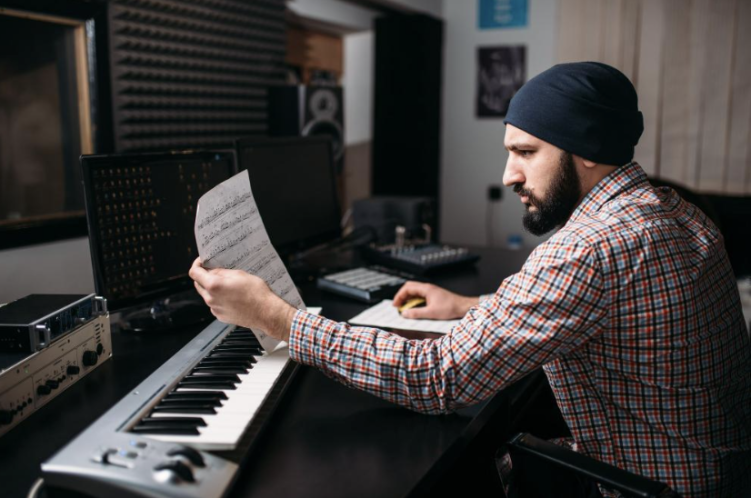Writing is the activity of composing texts for various purposes. It is a neuropsychological activity that requires the use of cognitive and creative skills. Writing seamlessly presents an author’s thoughts. Music writing is the art of composing lyrics. The composer needs to think creatively and pay attention to the flow of words.
Writers who build excellent writing skills can also be good at composing music. They are engaged in research to find inspiration and quality content. They build their vocabulary and composition skills. These are skills required for good music composition. Here are different ways writing can boost your music composition skills.
Research skills and music composition skills
Literature writers have various rules they follow to create attractive texts. They must understand their audience and compose texts that fit them. They need to understand the seasons and what is trending. One of the key rules is to engage in deep research. Music benefits listeners in different ways. It boosts mood, reduces anxiety, and improves sleep.
It cannot serve that purpose if its lyrics and instruments are not in harmony. A music composer needs to engage in research to understand certain contexts. If they want to compose Rock N Roll, the composer needs to understand the genre’s background. They must research its effects, presentation, and tone. Their experience in research and writing can help them create attractive lyrics.
Music composition is an art that requires a great deal of creativity. There are millions of composers around the world. You can easily create lyrics that are similar to lyrics by another composer. If you are composing for college, the teacher might consider your work plagiarized. Use the teacher plagiarism checker FixGerald to scan your lyrics for plagiarism. You will be sure the lyrics are original before you submit your final work. You need to harness your skills in writing and focus on originality.
Building language vocabulary and music skills
Language is evolutionary and keeps developing as society develops. Language experts say writing is part of developing language. The author develops great vocabulary skills that can be useful in music composition. Music is interlinked with language and is often used as a teaching tool. Kids mainly learn language through music.
It helps develop memory and speech. Composing music requires the use of vocabulary, different language tones, and prose. Experts in the music field say many poets are also good music composers. People who engage more in writing develop language skills useful in composing music. They understand which phrases or vocabulary are right to use.
Creativity and imagination
Good music constitutes a variety of important factors.
- It must have excellent chords
- Its melodies must be flawless
- It requires well-flowing lyrics
- It evokes emotions
To classify music as good, music experts look at rhythm, harmony, melody, and pitch. Good writing constitutes coherence, focus, flow, and development. The author needs to present ideas, fluency, and voice coherently.
Writers are allowed to break the rules sometimes with good intentions. Their creativity is seen in every sentence they complete. It builds their imagination and boosts their creativity level. The same skills can be used to compose music that evokes emotions.
The art of storytelling and building writing skills
Good storytellers share their stories verbally with a small audience. Great storytellers write their stories and share them with a global audience. Stories contain powerful literary elements like the plot, theme, setting, and characters. The elements are what make stories captivating to audiences. Literary skills are built on three key elements:
- Ability to communicate effectively
- Ability to listen attentively
- Ability to speak eloquently
A variety of activities help people to build excellent literary skills. One of the activities is the art of storytelling. In the music world, stories engage audiences in a variety of ways. They link them to their personal stories and imaginations. Music acts as a connector and brings them close to themselves.
First, the music composer develops their own stories. They base them on their experiences or ideas. Most often, their audiences easily relate to their stories. Music composers with strong writing skills write stories that evoke emotions. They then turn their stories into lyrics and develop a hook as the chorus. Skills in writing help them avoid clichés and allow flexibility.
Conclusion
Literature and music are interrelated in different ways. Society is similarly connected to music with literature. Authors develop skills through research, reading, and language development. They build their creativity and imagination. Every skill a writer builds is useful when composing music that moves audiences. Music can help improve their mood, boost excitement, and improve sleep.
Author’s Bio
Emma Rundle has been active in the writing arena for some years and, during this time, won appreciation and some popular choice awards for her work. This has been made possible by her keen approach to handling every assignment with confidence and honesty. She delivers unique, well-researched, and high-scoring assignments consistently.


Writing is the activity of composing texts for various purposes. It is a neuropsychological activity that requires the use of cognitive and creative skills. Writing seamlessly presents an author’s thoughts. Music writing is the art of composing lyrics. The composer needs to think creatively and pay attention to the flow of words.
Writers who build excellent writing skills can also be good at composing music. They are engaged in research to find inspiration and quality content. They build their vocabulary and composition skills. These are skills required for good music composition. Here are different ways writing can boost your music composition skills.
Research skills and music composition skills
Literature writers have various rules they follow to create attractive texts. They must understand their audience and compose texts that fit them. They need to understand the seasons and what is trending. One of the key rules is to engage in deep research. Music benefits listeners in different ways. It boosts mood, reduces anxiety, and improves sleep.
It cannot serve that purpose if its lyrics and instruments are not in harmony. A music composer needs to engage in research to understand certain contexts. If they want to compose Rock N Roll, the composer needs to understand the genre’s background. They must research its effects, presentation, and tone. Their experience in research and writing can help them create attractive lyrics.
Music composition is an art that requires a great deal of creativity. There are millions of composers around the world. You can easily create lyrics that are similar to lyrics by another composer. If you are composing for college, the teacher might consider your work plagiarized. Use the teacher plagiarism checker FixGerald to scan your lyrics for plagiarism. You will be sure the lyrics are original before you submit your final work. You need to harness your skills in writing and focus on originality.
Building language vocabulary and music skills
Language is evolutionary and keeps developing as society develops. Language experts say writing is part of developing language. The author develops great vocabulary skills that can be useful in music composition. Music is interlinked with language and is often used as a teaching tool. Kids mainly learn language through music.
It helps develop memory and speech. Composing music requires the use of vocabulary, different language tones, and prose. Experts in the music field say many poets are also good music composers. People who engage more in writing develop language skills useful in composing music. They understand which phrases or vocabulary are right to use.
Creativity and imagination
Good music constitutes a variety of important factors.
To classify music as good, music experts look at rhythm, harmony, melody, and pitch. Good writing constitutes coherence, focus, flow, and development. The author needs to present ideas, fluency, and voice coherently.
Writers are allowed to break the rules sometimes with good intentions. Their creativity is seen in every sentence they complete. It builds their imagination and boosts their creativity level. The same skills can be used to compose music that evokes emotions.
The art of storytelling and building writing skills
Good storytellers share their stories verbally with a small audience. Great storytellers write their stories and share them with a global audience. Stories contain powerful literary elements like the plot, theme, setting, and characters. The elements are what make stories captivating to audiences. Literary skills are built on three key elements:
A variety of activities help people to build excellent literary skills. One of the activities is the art of storytelling. In the music world, stories engage audiences in a variety of ways. They link them to their personal stories and imaginations. Music acts as a connector and brings them close to themselves.
First, the music composer develops their own stories. They base them on their experiences or ideas. Most often, their audiences easily relate to their stories. Music composers with strong writing skills write stories that evoke emotions. They then turn their stories into lyrics and develop a hook as the chorus. Skills in writing help them avoid clichés and allow flexibility.
Conclusion
Literature and music are interrelated in different ways. Society is similarly connected to music with literature. Authors develop skills through research, reading, and language development. They build their creativity and imagination. Every skill a writer builds is useful when composing music that moves audiences. Music can help improve their mood, boost excitement, and improve sleep.
Author’s Bio
Emma Rundle has been active in the writing arena for some years and, during this time, won appreciation and some popular choice awards for her work. This has been made possible by her keen approach to handling every assignment with confidence and honesty. She delivers unique, well-researched, and high-scoring assignments consistently.
Related Content: